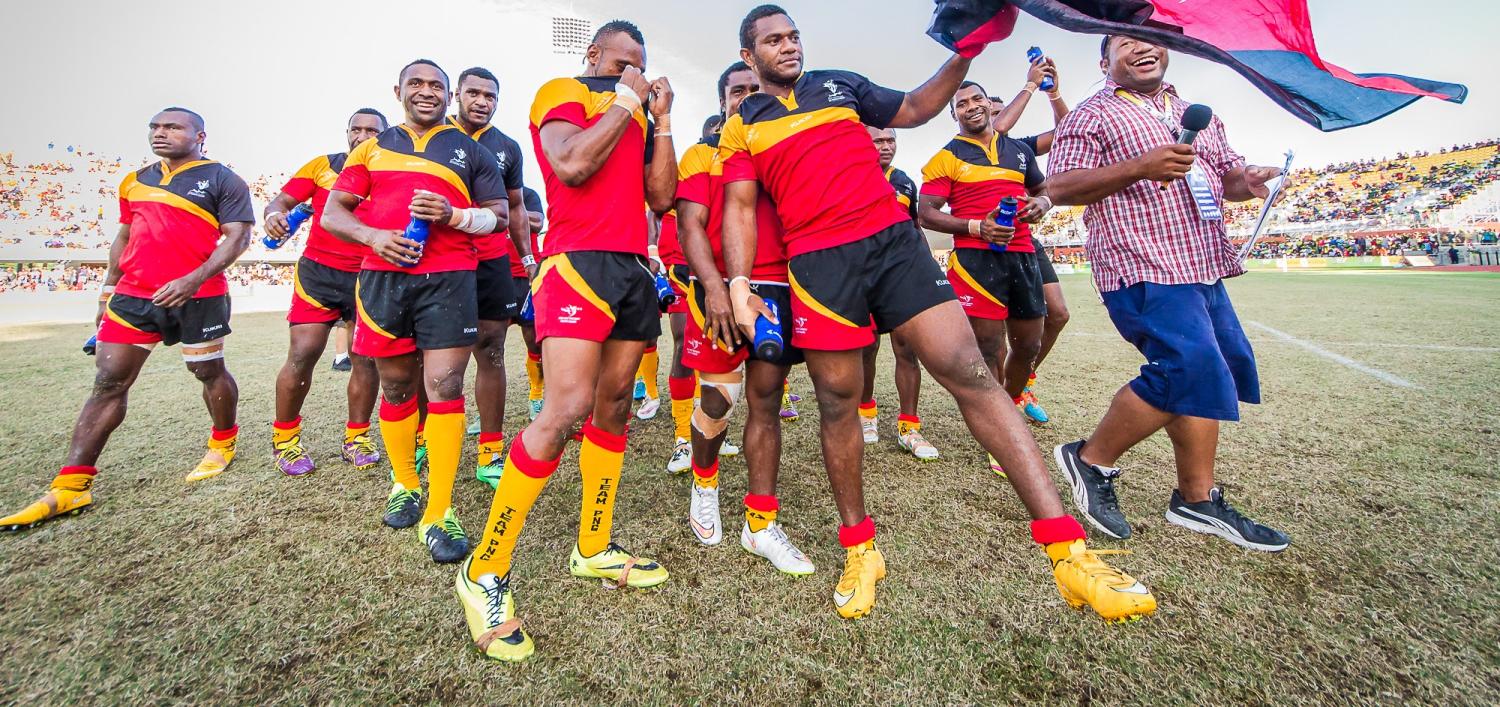You don't have to spend much time in Papua New Guinea to realise that the country is obsessed with rugby league. The atmosphere in Port Moresby on a State of Origin night could rival the most devout regions of New South Wales or Queensland. Rugby league is considered PNG's national sport. In a country of eight million people and 800 languages it has a unique power to bring Papua New Guineans together across cultural divides. Rugby league also has significant untapped potential to build the relationship between Australia and Papua New Guinea.
The highlight of PNG's rugby league calendar is an annual clash against an Australian select side, the Prime Minister's XIII. The experience is a much-needed eye-opener for the visiting Australian players, many of whom have little perspective of the popularity of the sport outside their own country. Recently, PNG has also established itself in the Australian rugby league landscape through the success of the PNG Hunters, the only overseas team in the Queensland Cup. Independently funded with very little support from Queensland Rugby League or the Australian NRL, the Hunters have made a splash in the competition, acting as fantastic ambassadors for PNG across Queensland and cultivating a sense of national pride among Papua New Guineans who would often identify with their home province over their home country. As of writing, they have won seven out of nine games this season, a remarkable feat for a team in its fourth year in the competition.
As the Hunters start to hit their stride, the potential for talent development in PNG should become more evident to the Australian NRL. The Pacific is already seen as one of the major talent pools for the sport – 42% of professional players are of Pacific Island heritage, a number only forecast to grow. And yet of these players only a handful are Papua New Guineans, even though PNG makes up roughly 75% of the population of the Pacific states and Papua New Guineans are the most fervent supporters of the sport in the region.
New Zealand's Pacific migration system is a significant contributing factor to the prevalence of Polynesian players in the Australian NRL. A number of Polynesian countries have migration access to New Zealand and therefore, as a result of the open border policy with New Zealand, Australia. That means more Polynesian players than Papua New Guineans have access to training systems in Australia and New Zealand from a young age. For the majority of players to reach the elite level of the sport they need to be in in these high level training programs by the age of 16 or 17. Targeting youth is essential to growing the numbers of professional Papua New Guinean players.
With the right support and investment Papua New Guinean athletes would be an asset to Australian rugby league. Providing Papua New Guinean players with more opportunities in Australia will also have flow-on benefits for the sporting landscape and ecosystems in PNG, meaning that more Papua New Guineans who want to have a career in rugby league can achieve that without having to leave PNG.
PNG's rugby league fan base also presents commercial opportunities for Australia. NRL jerseys are a national uniform, and Papua New Guineans pride themselves on their encyclopaedic knowledge of the sport and its superstars. Already most Papua New Guineans who travel to Australia will make sure they find the time to attend a match during their trip. Both the NRL and the tourism sector should take advantage of PNG's growing middle class and their passion for rugby league, and target this market in their commercial strategies.
Rugby league tourism also has huge potential in Papua New Guinea. In 2017 PNG will host three Rugby League World Cup games, and the country also regularly hosts PNG Hunters home games for the Queensland Cup. Rugby league and tourism bodies should be collaborating to ensure that a variety of packages are available and easily accessible for fans around the world who want to attend a match and experience PNG's unique tourist attractions. Rugby league tourism can also spark new interest in PNG among Australian rugby league fans to build new people-to-people links between the two countries, while also supporting PNG's economic development.
Finally, there a number of innovative programs making use of the sport's popularity to achieve important development outcomes in PNG. These include League Bilong Laif ('League for Life'), a sport for development program launched in 2013 that uses rugby league as a basis for school and community activities. The program comprises outdoor and classroom sessions, features rugby league-themed reading resources, and promotes the importance of education and messages of respect and inclusivity. One of the most striking results of the program has been a growing realisation among children, teachers and parents that rugby league is 'not just a man's game'. In a country with staggering rates of gender-based violence, seeing women in unexpected roles such as teaching, playing and coaching rugby league seems to be having a wider impact on perceptions of women in society, and changing girls' own views about what they are capable of.
It is clear that there is momentum in many parts of the rugby league relationship between Australia and PNG, and it's a good story to share. But more can be done to build on the successes achieved to date. These organisations and programs often operate in silos and don't have enough opportunities to come together. On March 28 the Lowy Institute, through the work of the Aus-PNG Network, did exactly that. We assembled sport administrators, male and female rugby league players, journalists, tourism professionals, private sector managers, NGO founders, researchers, coaches, sports diplomacy and foreign affairs representatives for a day of discussion to tease out these issues and discuss new connections and pathways. The outcomes document from the day can be found here, and a podcast interviewing some of the workshop participants is available here.

